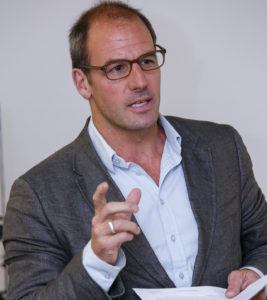Let’s start with a definition of Climate Change: for me, I describe it as the reduction of resources used by a company in order to create a sustainable business. As such, I think that Climate Change is not a disruptive force, at least not as a standalone item. It is only when it’s linked to other forces that the disruption occurs. For instance, Uber is a tech disruptor first that comes with a massive impact on climate change. Over the years, we have seen that attitudes with regard to climate change have been very slow in evolving. Recycling has grown in a fairly uniform way over the past 15-20 years. Yes, we see climate change entering into the psyche and business plans, but it is not a disruptive manner. If there is disruption, it comes because Silicone Valley companies have disrupted an industry and, as a by-product, there has been an impact on climate change. If climate change is about using ever less resources in a more astute and efficient manner, it is an ever-present challenge for businesses. We are not just referring to saving environmental resources; but, we are looking at reducing water bills, electricity costs, etc. It’s an evolutionary and ongoing business challenge.
When we look at the Silicone Valley innovations that have made such waves in various industries, the business models are being disrupted and, in many cases, we have been receiving a major windfall for climate change. The point is that, while many of these initiatives are climate change positive, very few start out with Climate Change as the disrupting fuse. [my term!] Maybe Elon Musk’s Tesla is the best counter example. However, for the most part, the corollary is that there is a lot more money floating around for investments in social impact.
On the side of CSR, employees and clients are both aware. However, it is rarely critical to the decision-making. CSR is a component, but an ever reducing part, in our experience. At Nike, for example, it is the CFO who has taken charge of CSR, where it is all about driving a sustainable business. The equation leads with resource and cost reduction. Afterwards, such actions contribute to a positive image for the company. I like to say that CSR provides a broad hue from the consumers’ perspective.
To the extent I am positive about the human being’s power to solve problems, I think that we will come up with solutions for the challenges of climate change and finite natural resources. For example, we see that solar power energy will become two times more powerful within the next 24 months. With the same timeframe, energy storage will become 10x more effective. These advancements will of course bring with them other challenges, but from a business perspective the need to reduce energy costs will remain similarly pertinent over the long term.
Bottom line, we are already on a positive journey with regard to climate change. There will be iconic moments that may alter and shape the narrative, but the need to adapt to climate change is old news. Any potential disruption will occur first and foremost for businesses that are directly in energy. Secondly, there are complementary businesses — such as transportation — that rely heavily on the consumption of these energies.

Giles Gibbons, CEO and Founder of Good Business, author of “Good Business: Your World Needs You” (on Amazon)










